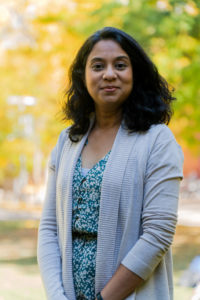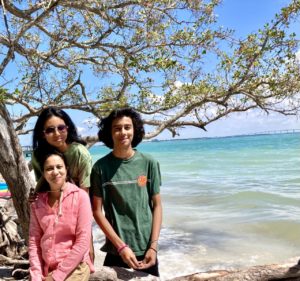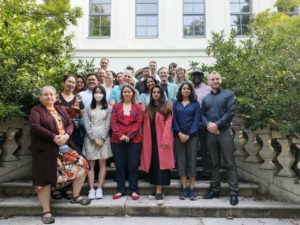
Runeela Taskeen, a Ph.D. student in the Education, Equity, and Transformation program, researches how peace education in developing nations can reduce violence and improve quality of life. Taskeen was one of only 32 researchers presenting her work at an international conference on decolonizing peace education in Germany.
Could you introduce yourself?
My name is Runeela Taskeen, and I am a Ph.D. student in the Education, Equity, and Transformation program at the School of Education. My research area is exploring Peace Pedagogy in the global south using decolonial educational frameworks. Originally, I am from Pakistan. I spent nine years of my early childhood in Libya, and after that, I moved to Lahore. I came to the U.S. on a Fulbright scholarship and earned an M.A. in Teaching English as a Foreign/Second Language here at CSU. After that, I joined the School of Education to start my Ph.D. in EET.
Since starting in the teaching and learning profession in 2000, I have enjoyed teaching in Pakistan, China, and the U.S. The most rewarding part of my journey has been teaching students from a wide array of cultures. I am a single mother of two teenage children, and they are the joys of my life. If asked about my identity then I am a mother first, then a lifelong learner, and a woman of my mind. I love cooking, reading, spending time with my friends, and long walks.
What has been your academic or life journey that brought you to pursue a Ph.D. in the School of Education at CSU?
While earning my master’s degree, the coursework and research on multicultural education piqued my interest. Being from Pakistan, which is a vibrant and multicultural country with five distinct provinces, it was natural for me to be drawn to this. Unfortunately, Pakistan is in the news for all the wrong reasons, but that is only one side of the coin, the other side is a country that speaks multiple languages, where culture is represented in unique ways of dressing, food, and mores.
Professor Emeritus William Timpson provided insight into how the field of education could help develop skills and attitudes for peaceful co-existence and teach about the ways to de-escalate conflicts on personal and societal levels. This opened a research venue for me that was pertinent to my personal and professional life history.
What is your research focused on?
I concentrate on the possible spaces for the implementation of peace pedagogy where government and policy structures do not support those practices. These regions are specifically non-western. My area of interest is the global south, but I am familiar with research and peace scholars in the context of Africa and the Middle East and use that to inform my work in other regions.
Why have you chosen to focus on peace pedagogy in the global south?

Education is the only answer to help to de-escalate violence and social crimes. I believe all of us are stewards of organic interdependence and its maintenance in this universe. On a micro-level, we educators must prioritize the teaching of inherent human nature. Conflict is a natural part of humanity, and so is the effort to find solutions to those conflicts. In the current world of ever-increasing transnational movements and crimes of social discrimination, we need to teach and advocate learning about the ways, skills, and attitudes to manage violent tendencies to create peaceful living conditions for everyone.
Being from Pakistan, I have experienced and witnessed violence owing much to the propaganda of domination-based structures may that be religion or economic dependence, or ideological imposition. I have seen how such knowledge production trickles into curriculum, practice, and learning processes thus impacting the everyday lives of people. Decades of such educational oppression are now structurally embedded. My objective is also to know how other educators in non-western regions are deconstructing the hegemony of “white-centric” knowledge and co-constructing the realities of conflicts with local people to find ways to continue teaching about peace.
What impact do you hope to have through your research and scholarship?
In my small way, I want to contribute to bridging the gap between the theorizing of peace education in official narratives and practical reality on the ground. To do this, I interview educators and practitioners at the grassroots level to understand how they do the meaning-making of peace pedagogy by employing local wisdom. This decolonial knowledge of peace pedagogy absent of western ideology could help in areas of ongoing and intractable conflict devoid of government support.
You recently attended a conference abroad, what was it?

The conference was held by the Georg Arnold Leibniz Institute for Educational Media, in Germany, and this was the institute’s inaugural conference. The theme was Education for Sustainable Peace: Decolonizing Peace Education by Problematizing Colonial Power Dynamics, Knowledge Production, and Ways of Knowing. 32 scholars were selected to present from a worldwide call for proposals.
I was excited to be a part of this conference because there are not many opportunities to discuss or share this specific research at CSU, and I’m grateful that my committee was supportive in helping me work in this area. Specifically, my advisor Louise Jennings. She has been instrumental in supporting my work. While working on the third article of my dissertation, I was interviewing a peace educator in Pakistan who works with Afghan youth and mothers to teach self-worth and detect early signs of radicalism and terror-involved activities.
During this time, I was also working on a certification to work with an Afghan refugee resettlement program here in the U.S. Both experiences put me in a unique position to contemplate the life situations of Afghan refugees in Pakistan, and those coming to the U.S. While in the U.S. the program is geared towards assimilation and education, Pakistani peace educators are struggling to address issues of terrorism, small-time crimes, poverty, and religious indoctrination. These differences are a big eye-opener to how in post-colonized times, developing countries are battling forces that are unseen daily in the west. This makes it even more important to find answers to how peace education can be implemented.
Trauma-informed pedagogy helped me a lot in helping Pakistani peace educators develop their literature for Afghan households for detecting early signs of radicalism. This literature was developed with youth and especially Afghan mothers, who in community meetings, sat together to relate their experiences and came up with a plan to help their young boys.
At this conference, there was a workshop offered by the International Rescue Committee. This further motivated me to apply to the workshop. As I was already listening to the stories shared by my participant, I anticipated participation in the workshop would help me understand what educational framework the UN employs for teaching about peace in refugee camps and camps for internally displaced people. The work of the United Nations for peace initiatives is very relatable to the regions of ongoing conflicts.
How did you contribute to the conference?
I shared a presentation based on those experiences, titled, A phenomenological interview approach to understand peace Pedagogy: Accounts of experiential excerpts of educators in India and Pakistan.
Instead of using Western knowledge and standpoints, I presented the practices of peace educators on conflict-ridden grounds and how they find channels to continue working for peace through education and activism. Through my research, I hope to contribute to the knowledge about the peace pedagogy devised locally by emphasizing the meaning-making and nature of peace pedagogy through the experiential excerpts of peace educators working in India and Pakistan.
The School of Education is part of CSU’s College of Health and Human Sciences.